fresh

detox and recharge with easy recipes for everyday vitality
Most people seem to think healthy eating entails boredom and deprivation. I beg to differ! Besides providing fuel for energy, food should taste good, and every mealtime should be a celebration. Making little adjustments to your diet as you go along will mean more in the long run than trying to stick to radical regimes, and you’re more likely to stick to the changes if you enjoy your food. Try to lessen your dependency on animal protein and cut back on saturated fats, refined sugars and salt. I use lavish amounts of fresh and dried herbs and spices to flavour my cooking, plenty of olive oil, ginger, chilli and garlic, and try to make the most of colours and textures to add plate appeal. Grains are good for you, as are fibre-rich beans, juicy fruits and vegetables, served with plenty of leafy greens, nuts and seeds for their essential mineral content. Alcohol and caffeine give false energy, so you’re better off without them. Pretty soon you’ll discover that without artificial additives, colourants and preservatives your food will taste fresher and lighter, and you will positively sparkle with vitality. It’s worth the expense to invest in a juice extractor and food processor, some non-stick pans and natural, organic produce where at all possible. The time saved leaves you free to use your new-found energy elsewhere!
Citrus zinger salad with mint and pomegranate
A sparkling citrus treat to brighten up winter-dulled palates.
Ingredients
- 2 ruby grapefruit, 2 oranges and 2 tangerines, all with peel and pith removed and sliced horizontally. Work over a bowl and save any juices that run out.
- handful of fresh mint leaves
- 2–4 T (30–60 ml) pomegranate kernels
Method
- Roughly chop the fruit into a serving bowl and tear in the mint leaves.
- Add the reserved juices and pomegranate kernels and serve cold. Seedless green grapes make a good addition.
Serves 4
Rosy C-soother
A refreshing tonic against summer blazes – chill the fruit and semi-freeze the juice for a slushy effect.
Ingredients
- juice of 2 limes or 1 lemon
- 2 cups (500 ml) cubed watermelon, green exterior rind removed
- 400 g strawberries, hulled
- 2 cups (500 ml) diced fresh pineapple
- 3 cups (750 ml) cranberry juice
- 2 t (10 ml) grated fresh ginger
Method
- Place all the ingredients in a food processor and liquidise until smooth.
- Pour into glasses and serve chilled.
Serves 2–4
Toasted oat and berry breakfast trifle with vanilla yoghurt
Oats are a wonder food for anyone prone to energy crashes. This is a super-fast shortcut to muesli and good with any fruit you have at hand, especially stewed dried apricots and peaches.
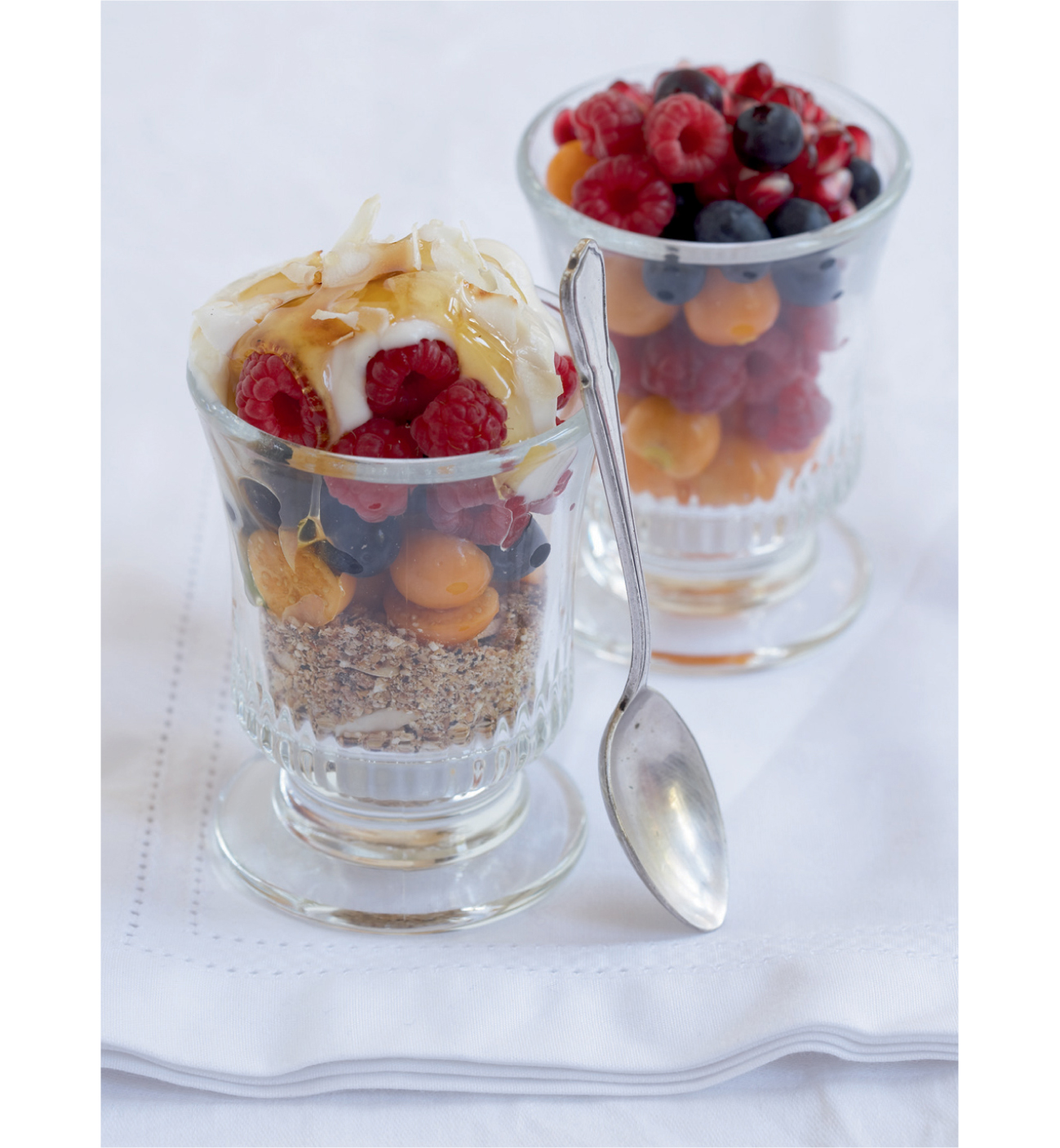
Ingredients
- 50 g slivered almonds, finely chopped
- 1 T (15 ml) sesame seeds
- 1 T (15 ml) desiccated coconut
- 75 g oat bran
- 1 t (5 ml) vanilla essence
- 2 T (30 ml) honey
- 300 ml chilled Greek yoghurt
- 2 cups (500 ml) mixed fresh berries or any other diced fresh or stewed fruit
Method
- Mix the almonds, sesame seeds, coconut and oat bran together and toast in a dry frying pan over a medium heat, stirring continuously, until golden brown. Remove from the heat and allow to cool.
- Stir the vanilla essence and honey into the yoghurt.
- Spoon the berries into serving glasses or bowls, top with the yoghurt and some toasted slivered almonds and serve.
Serves 3–4
Thai-chilli beef and noodle salad with cucumber, spring onion and peanuts
Use fillet if you can afford it, otherwise a nicely matured rump will do.
Ingredients
- 3 T (45 ml) soft brown sugar
- 1⁄2 t (2.5 ml) cayenne pepper
- 1⁄4 cup (60 ml) Thai fish sauce
- 500 g fillet or rump steak
- 1 t (5 ml) oil for grilling
- 2 medium cucumbers, peeled, deseeded and thickly sliced
- 6 spring onions, thickly sliced
- 1 red onion, peeled and thinly sliced
- 4 red chillies, deseeded and minced
- 1⁄2 cup (125 ml) fresh mint leaves
- 1⁄2 cup (125 ml) fresh coriander leaves
- 100 g rice vermicelli noodles, soaked in warm water until soft
- 1⁄2 cup (125 ml) unsalted peanuts, coarsely chopped
Dressing
- 1–2 t (5–10 ml) deseeded and very finely minced green chilli
- 2 t (10 ml) grated fresh ginger
- 1 t (5 ml) crushed garlic
- 6 T (90 ml) lime or lemon juice
- 2 T (30 ml) Thai fish sauce
- 1 T (15 ml) soy sauce
- 1 T (15 ml) honey or soft brown sugar
- 1 T (15 ml) sesame oil (optional)
Method
- Dissolve the soft brown sugar and cayenne pepper in the Thai fish sauce and brush over the steak. Leave for 15 minutes.
- For the dressing, whisk together all the dressing ingredients in a jug and set aside.
- Heat the oil in a frying pan over a high heat and grill the marinated steak to how you would like it done (for best results the steak should still be pink in the middle). Leave for 10 minutes and slice thinly.
- Place the steak slices in a large bowl and add the remaining ingredients, except the peanuts. Add the dressing and toss to coat.
- Transfer to a serving dish, sprinkle with the peanuts and serve immediately.
Serves 4
Marina’s minty lemon and chilli-grilled halloumi
My Greek friend Marina loves grilled halloumi as much as I do and this is her delicious take on the classic saganaki. Serve straight up for a snack or on dressed leaves for a classy starter.
Ingredients
- Approx. 500 g halloumi, sliced into roughly 1.5 cm-thick slices
- 2 red chillies, deseeded and finely diced
- grated zest of 1 lemon
- 2 T (30 ml) olive oil
- 1 T (15 ml) mint sauce
- 3 T (45 ml) extra-virgin olive oil
- salt and pepper to taste
- 120 g rocket leaves
Method
- Place the sliced halloumi on a tray. In a small jug, combine the chillies, lemon zest and olive oil and drizzle over the halloumi. Make sure each piece is properly coated on both sides.
- Leave to marinate for at least 30 minutes, preferably overnight. When ready to cook, drain the halloumi but reserve the leftover marinade for later.
- Heat a cast-iron pan over a high heat and fry the halloumi slices until golden brown on each side, 1–2 minutes (no extra oil is necessary). When cooked, remove the slices and set aside.
- In a bowl, whisk the mint sauce and extra-virgin olive oil with 1 T (15 ml) of the leftover marinade and season well with salt and pepper.
- Arrange the rocket leaves on individual plates and place the halloumi slices on top. Drizzle with the dressing and serve straightaway.
Serves 4–6
Red onion, black olive, orange and rocket salad
This classic Middle Eastern salad is ideal for mid-winter when fresh vegetables and leaves are hard to find. The rocket is not essential but adds a nice peppery bite. This is fantastic served with barbecued meat or fish.
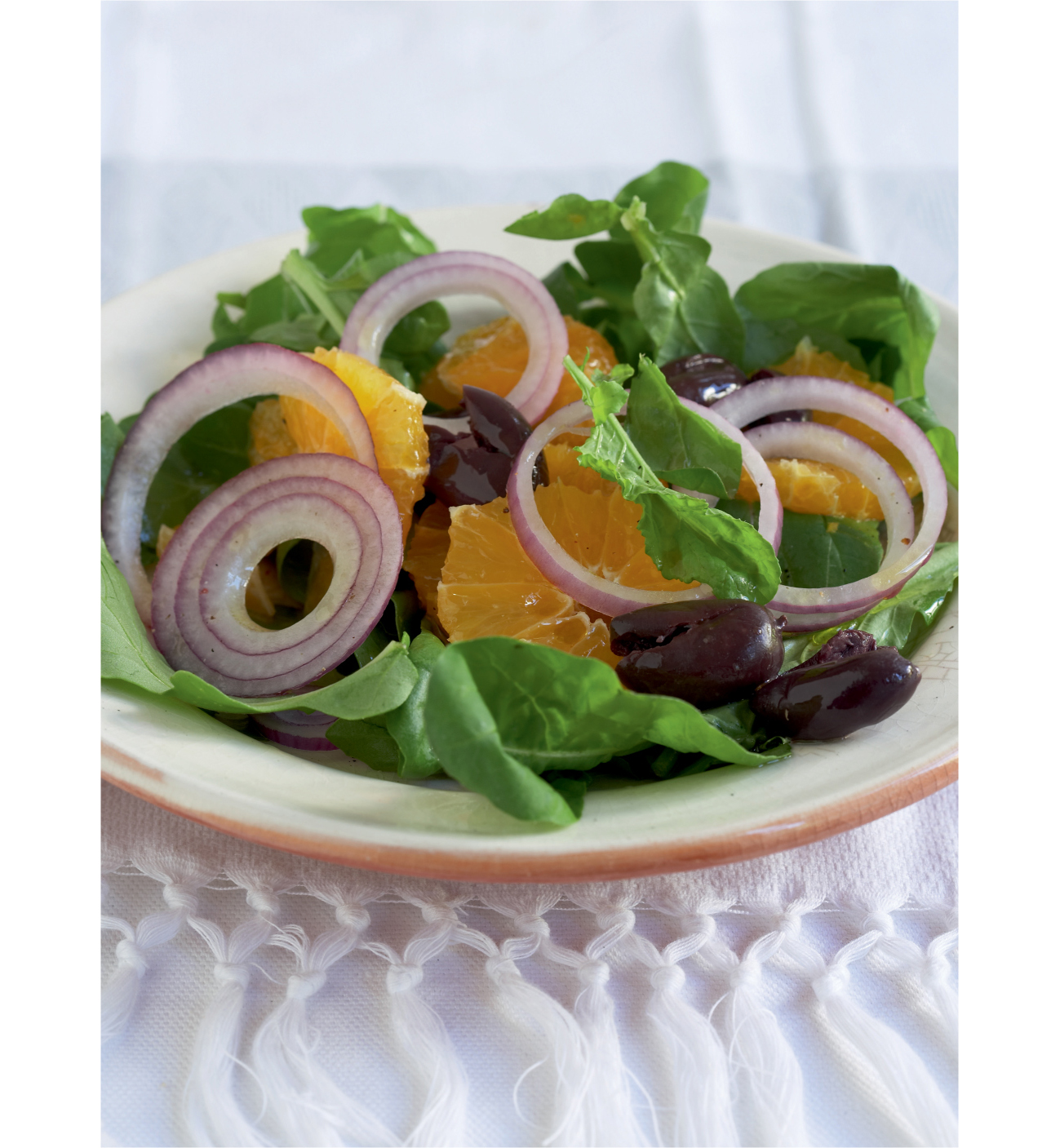
Ingredients
- 4 oranges, peel and pith removed and sliced horizontally
- 1 cup (250 ml) pitted black olives
- 1 large red onion, peeled and very thinly sliced
- 3 T (45 ml) extra-virgin olive oil
- 2 t (10 ml) red wine vinegar
- pinch of ground cumin
- salt and pepper to taste
- large handful of rocket leaves, torn into pieces
Method
- Chop the orange slices into chunks and place in a large bowl.
- Add the rest of the ingredients, toss and leave for 15 minutes (no longer) for the flavours to marry. Transfer to a serving dish and serve immediately.
Serves 4–6
French potato salad with olives, anchovies and tuna
Potatoes are greedy oil guzzlers, a problem this classic recipe neatly circumvents by using a stock-based dressing. The spuds are tasty enough alone without the combined ingredients, which add up to a classic Salade Niçoise.
Ingredients
- 500 g baby potatoes
- 3 T (45 ml) prepared chicken or vegetable stock
- 1 T (15 ml) Dijon or grain mustard
- 3 T (45 ml) tarragon white wine vinegar
- salt and pepper to taste
- 3 T (45 ml) chopped fresh parsley or basil
- 1⁄2 cup (125 ml) extra-virgin olive oil
- salad leaves to serve
- 1 x 170 g can tuna
- 12 anchovy fillets
- 1 cup (250 ml) halved baby tomatoes
- 6 marinated artichokes, quartered (optional)
- 1 cup (250 ml) pitted black olives
Method
- Cook the potatoes in a saucepan of well-salted water until just tender. Drain and halve.
- Mix the stock, mustard, vinegar, salt and pepper with the herbs and pour over the hot potatoes. Leave to soften for 20 minutes, then stir through the oil.
- To serve, place the potatoes on a bed of salad leaves and scatter over the remaining ingredients. Keeps well in the refrigerator for up to two days.
Serves 4–6
Beetroot, avocado, pea and feta salad on baby spinach with honey-mustard dressing
Using shop-bought cooked beetroot makes this salad a speedy treat, lovely as a side with any grilled meat or fish.
Ingredients
- 1 cup (250 ml) frozen baby peas
- 4 handfuls of baby spinach, watercress and rocket leaf mix, about 110 g
- 8 small cooked beetroot, chopped
- 2 ripe avocados, pitted, peeled and chopped
- 2 rounds feta, chopped
Honey-mustard dressing
- (Makes 175 ml)
- 2 T (30 ml) honey
- 5 t (25 ml) red wine vinegar
- 1⁄4 t (1 ml) salt
- 2 t (10 ml) Dijon or grain mustard
- 1 T (15 ml) finely minced onion
- black pepper to taste
- 6 T (90 ml) olive oil
Method
- Place the frozen peas in a saucepan and cover with boiling water. Drain and repeat, this time leaving the peas in the water for 15 minutes before draining again.
- Place the leaves on four plates and arrange the beetroot, avocado, feta and peas on top.
- In a jug, whisk together all the dressing ingredients until emulsified, then drizzle over the individual salads. Serve immediately.
Serves 4
Spa salad with red peppers, broccoli and asparagus
This is a gorgeous crunchy, munchy salad – add prawns or grilled chicken strips instead of cottage cheese for a more substantial meal. Use juicy sugarsnap peas, green beans or a cup of cooked sweetcorn instead of asparagus.
Ingredients
- 2 cups (500 ml) broccoli florets
- 170 g thin or fat green asparagus spears, cut into 3 cm chunks
- 200 g low-fat chunky cottage cheese, any flavour
- 1 T (15 ml) chopped fresh herbs
- 3 spring onions, finely sliced
- 4 handfuls of mixed salad leaves, about 120 g
- 1 large red pepper, deseeded and sliced
- 1 cup (250 ml) rosa tomatoes
- 2 carrots, peeled and cut into strips
- 1 T (15 ml) each of pumpkin, sunflower and sesame seeds
Dressing
- 1 t (5 ml) grated fresh ginger
- 2 T (30 ml) soy sauce
- 2 T (30 ml) sesame oil
- 2 T (30 ml) extra-virgin olive oil
- black pepper to taste
Method
- Steam the broccoli and asparagus in a sieve over a saucepan of rapidly boiling water until just tender – about 4 minutes. They must be bright green and still crunchy. Remove and allow to cool.
- In a bowl, combine the cottage cheese with the herbs and spring onions.
- In a separate bowl, whisk together the dressing ingredients.
- Arrange the salad leaves on four plates, place a large scoop of the cottage cheese mixture on top of each and scatter over the broccoli, asparagus, red pepper, tomatoes, carrots and seeds. Drizzle with the dressing and serve straightaway.
Serves 4
Tomato soup with basil oil
A really good homemade tomato soup is a beautiful thing to eat. Perfectly balanced between tantalising tartness and mellow sweetness, rounded to a glossy crimson by slow simmering, it needs little besides a slick of basil oil or some grated Cheddar stirred in at the last minute. Mince the vegetables and herbs in a food processor to save time.
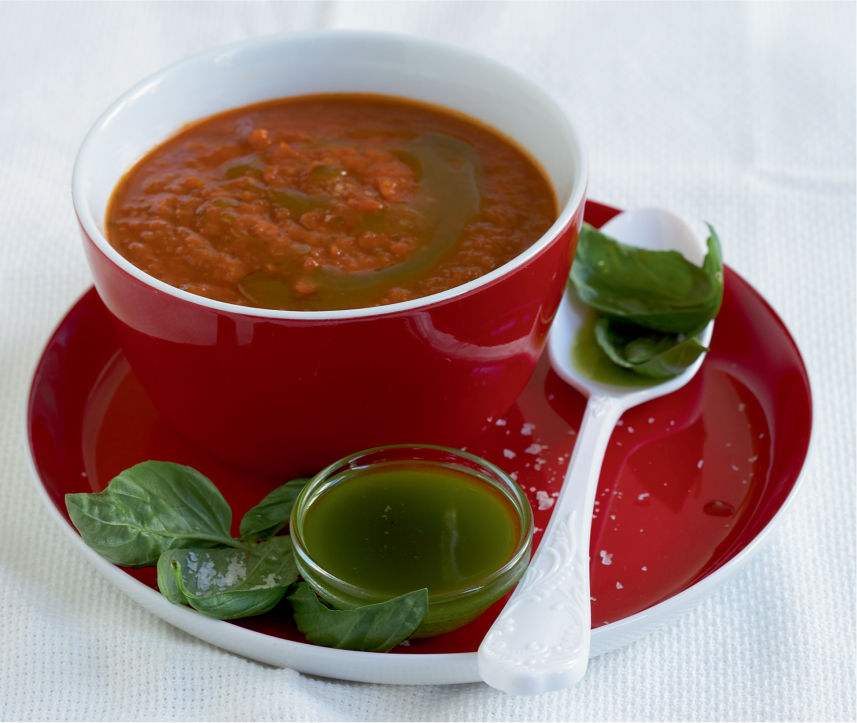
Ingredients
- 6 T (90 ml) extra-virgin olive oil
- 1 large onion, peeled and minced
- 1 medium leek, white stem only, rinsed thoroughly and minced
- 1 celery stick, minced
- 1 large carrot, peeled and diced
- 1 t (5 ml) minced garlic
- 1⁄2 cup (125 ml) chopped fresh parsley
- 1 t (5 ml) chopped fresh marjoram
- 1 large potato, peeled and coarsely grated
- 2 x 410 g cans chopped peeled tomatoes
- 1 x 410 g can tomato purée or passata
- 6 T (90 ml) tomato concentrate
- 2–3 t (10–15 ml) salt
- 4–6 T (60–90 ml) sugar
- 1 T (15 ml) soy sauce
- 6 cups (1.5 litres) good-quality chicken or vegetable stock (use 3 cubes)
- salt and pepper to taste
- 1 cup (250 ml) grated mature Cheddar or basil oil (see below)
Method
- Heat the oil in a large heavy-bottomed saucepan over a medium heat.
- Add the onion, leek, celery, carrot, garlic and herbs and sweat with the lid on for about 15 minutes. Stir frequently until softened, but not browned.
- Now add the remaining ingredients, except the salt, pepper and cheese, stir briskly and bring to a rolling boil. Stir again and lower the heat to a very gentle simmer.
- Leaving the lid off, let the soup quietly bubble away for about 40 minutes, stirring every 15 minutes to prevent the vegetables scorching on the bottom of the pan.
- Remove from the heat when everything is meltingly soft and leave to cool for 5 minutes before processing until smooth. (Using a stick blender makes this infinitely easier.)
- Season to taste and serve with grated Cheddar on the side or add a dash of basil oil at the last minute. Grated Gruyère cheese, rosemary or coriander pesto, fresh herbs and croutons all make equally good accompaniments to this soup.
Serves 8–10
Basil oil
Method
- Bring a large saucepan of water to the boil. Plunge a large fistful of basil leaves into the boiling water for 30 seconds and remove quickly. Rinse under cold water and pat very dry with absorbent paper. Blend the basil in a liquidiser with 11⁄2 cups (375 ml) extra-virgin olive oil until very smooth. Pour into a sterilised screw-top glass jar and refrigerate until needed. (It will keep a week, no longer.)
- Replace the basil with parsley, coriander or mint, or combine all four for a heady herbal condiment. Blended with lemon juice, minced garlic and seasoning, this green ‘unguent’ makes a zippy salad dressing or marinade for char-grilled vegetables too.
Chef’s tip
The acidity of canned tomatoes varies from season to season, in which case you will have to adjust the amounts of salt, sugar and tomato concentrate to get that perfect ‘tomato-ey’ intensity. Just stir directly into the soup, simmer for a few minutes and taste as you go along. You can freeze individual soup portions for up to three months.
Chicken dumpling soup with peas, lime and coriander
This is real kitchen medicine for when you’re feeling low. To make life easier, mince the chicken in a food processor; alternatively, mince very finely by hand.
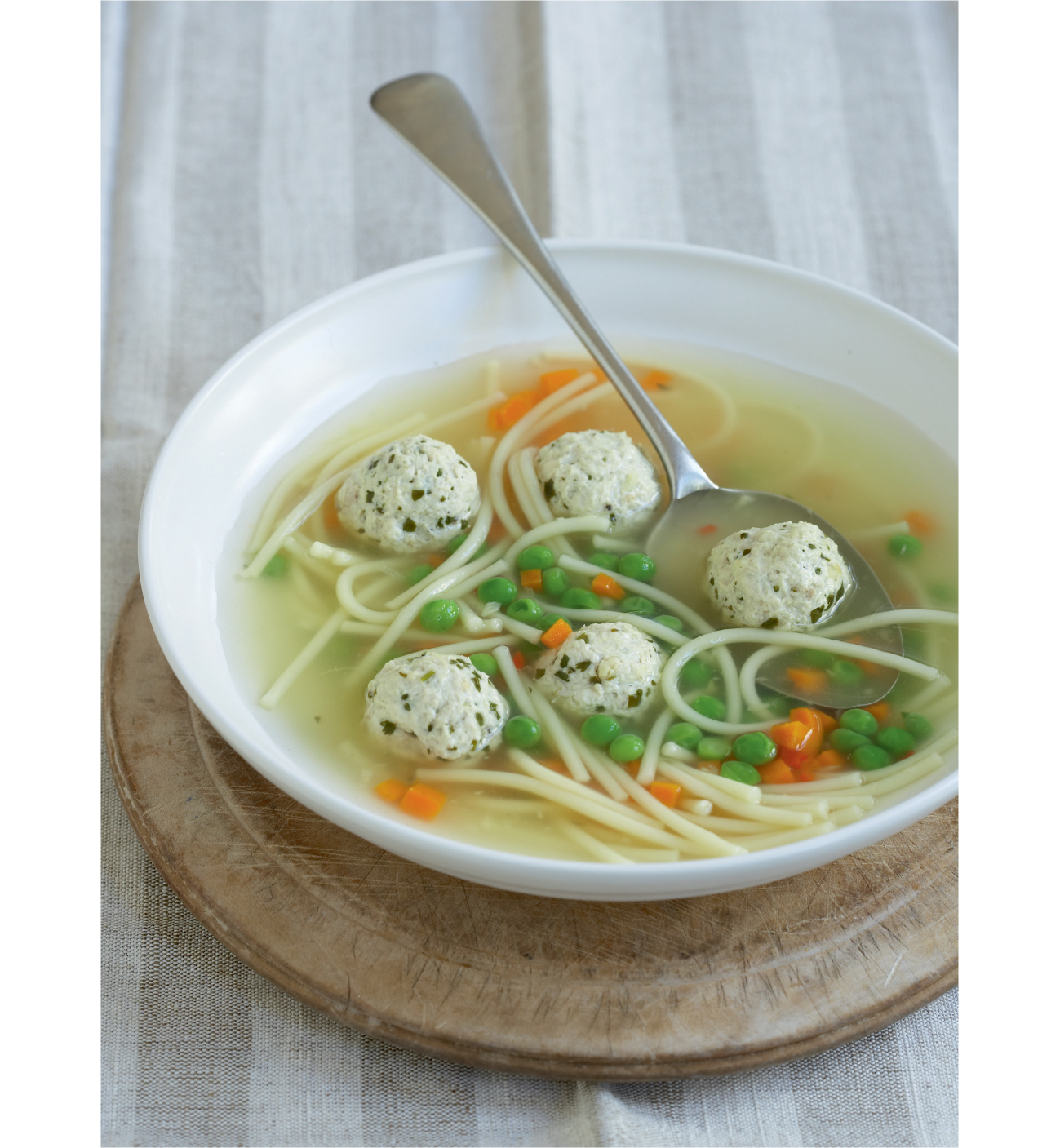
Dumplings
- 1 t (5 ml) finely minced lemongrass
- 400 g chicken fillets or breasts, finely minced
- 1 t (5 ml) grated fresh ginger
- 1 T (15 ml) chopped fresh coriander
- salt and pepper to taste
Soup
- 41⁄2 cups (1.125 litres) good-quality chicken stock, preferably homemade (see page 178)
- 1 small red chilli, left whole (optional)
- 1 t (5 ml) grated fresh ginger
- 1 t (5 ml) crushed garlic
- 1 T (15 ml) lime or lemon juice
- 50 g spaghetti, broken into short pieces
- 1 small carrot, peeled and coarsely grated
- 1 cup frozen baby peas
Method
- Mix the lemongrass, chicken, ginger, coriander and seasoning very well in a food processor or by hand. When the mixture begins to clump together, roll into walnut-sized balls. Set aside.
- In a large saucepan, heat the chicken stock, chilli (if using), ginger, garlic and lime or lemon juice to boiling point and drop in some of the chicken dumplings. As they float to the top, remove with a slotted spoon and add the rest, removing them as they too float to the top.
- Add the spaghetti and carrot, and cook for 15 minutes until soft.
- Return all the dumplings to the soup, add the peas and simmer for another 5 minutes. Serve straightaway.
Serves 4
Moroccan spicy lentils
Brown lentils need no soaking prior to cooking. Adding a little stock powder with some bay leaves and garlic to the cooking liquid dramatically improves the flavour. This salad keeps well for several days in the refrigerator.

Ingredients
- 500 g brown lentils, rinsed
- 4 cups (1 litre) water
- 1 t (5 ml) vegetable or chicken stock powder
- 2 bay leaves
- 2 garlic cloves, peeled and left whole
- 6 T (90 ml) olive oil
- 1 large onion, peeled and finely diced
- 2 t (10 ml) coriander seeds
- 1 dried red chilli
- juice of 1 lemon
- salt and pepper to taste
- 1⁄2 cup (125 ml) chopped fresh coriander
Method
- Place the lentils in a saucepan and cover with the water. Add the stock powder, bay leaves and garlic. Bring to the boil, then reduce the heat and simmer gently for about 30 minutes until tender, but not mushy. Drain and discard the leaves and garlic.
- Heat the oil in a large frying pan and cook the onion, coriander seeds and chilli until just soft and translucent. Stir in the lentils and lemon juice and season well. Remove from the heat and allow to cool before stirring in the chopped coriander. Transfer to a serving dish and drizzle over some more olive oil if desired.
Serves 4–6
Butter beans baked with onions, tomato, parsley and Parmesan
Having some canned pulses in the store cupboard makes rustling up a filling dish as easy as pie. This is great with grilled meat, chicken or fish, but I have been known to eat it as is with some crusty bread, a leafy salad and a wedge of good mature Cheddar.
Ingredients
- 2 T (30 ml) olive oil
- 2 t (10 ml) crushed garlic
- 1 large onion, peeled and chopped
- 1 celery stick, finely diced
- 1 x 410 g can chopped peeled tomatoes
- 1 x 215 g can tomato purée
- 1⁄2 cup (125 ml) chopped fresh parsley
- 1 t (5 ml) dried origanum
- salt and pepper to taste
- 2 x 410 g cans butter beans, drained and rinsed
- 1⁄2 cup (125 ml) grated Parmesan
- 3 T (45 ml) breadcrumbs
Method
- Preheat the oven to 180 °C.
- Heat the olive oil in a frying pan over a medium heat and cook the garlic, onion and celery until soft and aromatic. Add the tomatoes, tomato purée, parsley, origanum and seasoning and cook for a further 15 minutes until thickened.
- Add the beans and stir through. Spoon the mixture into an ovenproof dish and scatter over the Parmesan and breadcrumbs.
- Bake for about 30 minutes, until golden brown and crusty on top.
Serves 4–6
Burghul with roast butternut, chickpeas, peppers and spinach
The smoked paprika adds a wonderful depth to this dish. Keep for up to three days in the refrigerator and serve as a side dish or stuffed in pitas with tzatziki and tomato relish.
Ingredients
- 500 g butternut, peeled and cut into chunks
- 2 large red peppers, deseeded and cut into chunks
- 2 t (10 ml) smoked paprika
- 2 T (30 ml) harissa or chilli paste
- 1 t (5 ml) oil
- salt and pepper to taste
- 1 t (5 ml) vegetable or chicken stock powder
- juice of 1 lemon
- 1 T (15 ml) olive oil
- 11⁄2 cups (375 ml) boiling water
- 1 cup (250 ml) burghul (bulgur) wheat
- 1 x 400 g can chickpeas or three-bean mix, drained and rinsed
- 1 handful of baby spinach or rocket leaves, about 110 g
- 1 bunch of fresh parsley, chopped
- 1 bunch of fresh mint leaves, chopped
Dressing
- 1 t (5 ml) crushed garlic
- 1 t (5 ml) paprika
- 2 T (30 ml) lemon juice
- 1 cup (250 ml) low-fat plain yoghurt
- salt and pepper to taste
Method
- Preheat the oven to 200 °C. Place the butternut and red peppers on a baking tray and season with the smoked paprika, harissa or chilli paste, oil, salt and pepper. Bake for 25–35 minutes, until soft and slightly charred.
- Meanwhile, mix the stock powder, lemon juice and olive oil with the boiling water and pour over the burghul in a bowl. Cover with a plate and leave for about 20 minutes to swell and soften.
- In a jug, combine the dressing ingredients, stir well and set aside.
- Add the chickpeas, roast vegetables, spinach or rocket leaves and herbs to the burghul and mix well. To serve, arrange on plates and drizzle over the dressing.
Serves 6
Chef’s tip
Save time by leaving out the roast vegetables and replacing with 1 cup (250 ml) each of diced celery and halved rosa tomatoes.
Sticky cashew chicken
My children love this tasty low-fat treat so much that there is usually a dish of sticky chicken somewhere in our refrigerator – you can leave the chicken to marinate for anywhere between 30 minutes and three days. Use any cut of chicken you like, just adjust the cooking time accordingly. Thighs take the longest to cook, while fillets or diced breasts are the quickest. Turkey or pork work well too. This dish couldn’t be easier or yummier!

Ingredients
- 400 g chicken fillets or skinless deboned thighs
- 100 g cashew nuts
- 1 T (15 ml) toasted sesame seeds
- handful of fresh coriander, chopped to garnish
- black pepper to taste
Sauce
- 1 T (15 ml) balsamic vinegar
- 3 T (45 ml) light soy sauce
- 2 t (10 ml) crushed garlic
- 2 t (10 ml) grated fresh ginger
- 1⁄4 cup (60 ml) honey
- 2 T (30 ml) sesame oil
- 2 T (30 ml) hoisin sauce or chutney
Method
- Line a shallow ovenproof dish with the chicken pieces.
- To make the sauce, combine all the ingredients in a jug and pour over the chicken. Cover and leave to marinate in the refrigerator for anywhere between 30 minutes and three days. Allow the dish to return to room temperature before cooking.
- Preheat the oven to 180 °C.
- Scatter the cashew nuts over the chicken and stir into the sauce.
- Bake for 20–25 minutes until the chicken is just cooked and still succulent. Sprinkle over the sesame seeds and coriander, season with black pepper and serve with a salad of shredded vegetables and greens and some steamed rice.
Serves 4
Tandoori chicken kebabs with fresh coriander chutney
Yoghurt or buttermilk makes a wonderful marinade for all kinds of meat, especially cuts destined for the braai, as it tenderises and lends succulence. This marinade is also suitable for lamb, pork and turkey. Marinate the meat in the sauce for no less than 30 minutes and up to three days.
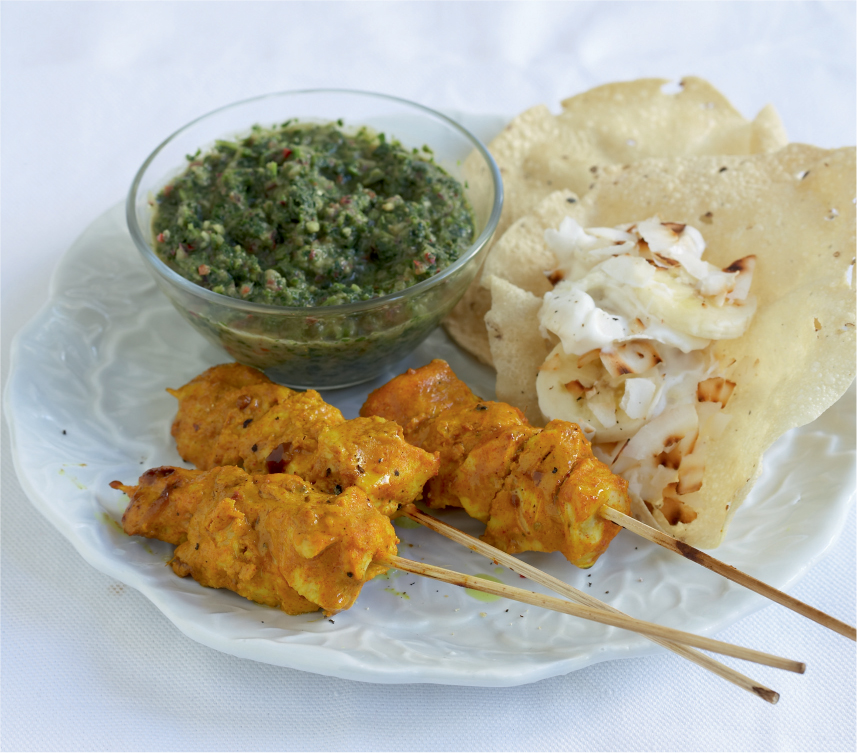
Ingredients
- 400 g boneless chicken, cubed
- 1 cup (250 ml) plain yoghurt or buttermilk
- 2 t (10 ml) crushed garlic
- 1 medium onion, peeled and grated
- 2 t (10 ml) grated fresh ginger
- 1 small red chilli, deseeded and minced
- 2 t (10 ml) ground turmeric
- 2 t (10 ml) paprika
- 1 T (15 ml) lemon juice
- 1⁄2 t (2.5 ml) salt
- black pepper to taste
- 10–20 wooden satay sticks
Method
- Combine all the ingredients in a marinating dish, cover and leave to marinate in the refrigerator for anywhere between 30 minutes and three days.
- About an hour before cooking, remove the chicken from the refrigerator to reach room temperature and soak the satay sticks in hot water to prevent them scorching on the grill.
- Thread the chicken cubes onto the satay sticks and grill over coals or in the oven until cooked – about 20 minutes. Discard any remaining marinade.
- Serve with basmati rice, poppadoms, banana sambal (see below) and fresh coriander chutney (see below).
Serves 4
Banana sambal
Ingredients
- 2 firm ripe bananas, peeled and chopped
- 1⁄2 cup (125 ml) plain yoghurt
- 1⁄4 cup (60 ml) desiccated coconut
Method
- Combine all the ingredients and chill until needed. Serve on the same day of making.
Fresh coriander chutney
Ingredients
- 4 cups (1 litre) fresh coriander leaves, stems discarded
- 2 cups (500 ml) chopped fresh mint
- 1 cup (250 ml) chopped onion
- 1–2 t (5–10 ml) crushed garlic
- 1–2 t (5–10 ml) grated fresh ginger
- 1–2 t (5–10 ml) ground cumin
- 2 t (10 ml) minced fresh chilli
- 1 t (5 ml) sugar
- 1 t (5 ml) salt
- 1⁄4 cup (60 ml) fresh lime or lemon juice
- 6 T (90 ml) plain yoghurt
Method
- Place all the ingredients in a food processor and blend to a smooth sauce. Alternatively, chop everything very finely together by hand. Chill until needed. The chutney will last for three days in an airtight container in the refrigerator.
Makes 2 cups (500 ml)
Banana nut curry with pilaf rice
Use firm green bananas for this quick and nutritious curry. You can replace the cashews with almonds or pecans, and try baby potatoes instead of the mushrooms.

Ingredients
- 2 T (30 ml) oil
- 1 T (15 ml) black mustard seeds
- 1 large onion, peeled and finely diced
- 1 T (15 ml) grated fresh ginger
- 2 t (10 ml) crushed garlic
- 1 red chilli, deseeded and minced
- 1 t (5 ml) ground turmeric
- 200 g button mushrooms
- 1 cup (250 ml) cauliflower florets
- 2 green peppers, deseeded and chopped
- 4 firm green bananas, peeled and cut into 3 cm chunks
- 100 g cashew nuts
- 1 x 400 ml can low-fat coconut milk
- 1 T (15 ml) lemon juice
- 2 T (30 ml) fresh or dried curry leaves
- salt and pepper to taste
- 1 cup (250 ml) loosely packed chopped coriander leaves
Method
- Heat the oil in a saucepan and fry the mustard seeds until they start to pop. Add the onion, ginger, garlic, chilli and turmeric and cook for 4–5 minutes until the onions are soft.
- Add the vegetables, bananas, nuts, coconut milk, lemon juice and curry leaves. Season well and simmer over a low heat for 15–20 minutes, until the vegetables are just tender, but not mushy. Scatter over the chopped coriander and serve with pilaf rice (see below) and sambals.
Serves 4
Pilaf rice
Ingredients
- 1 cup (250 ml) basmati rice
- 21⁄2 cups (625 ml) water
- 1⁄2 t (2.5 ml) salt
- 5 cm cinnamon stick
- 4 cardamom seeds
- 1 star anise
- 2 bay leaves
- 3 whole cloves
Method
- Place the rice in a sieve and rinse under cold running water until the water runs perfectly clear.
- In a saucepan on the stove, bring the water and salt to a rolling boil. Add the rice and all the spices, stir well and bring to the boil for 10 minutes under a tight-fitting lid.
- Without removing the lid, reduce the heat and cook for a further 15–20 minutes until the rice is perfectly cooked – small holes will form on the surface of the rice.
- Remove from the heat, keeping the lid on, and let the rice steam for a further 10 minutes. Fluff with a fork and serve hot.
Serves 4
Brown rice kedgeree with lentils, mushrooms and hard-boiled eggs
I find it useful to cook more rice than needed per meal and store the extra in the refrigerator, ready to be whipped up into speedy meals like nasi goreng, Korean chicken soup, Chinese stir-fried rice or this hearty vegetarian kedgeree. Kedgeree without the egg is a favourite lunchbox standby.
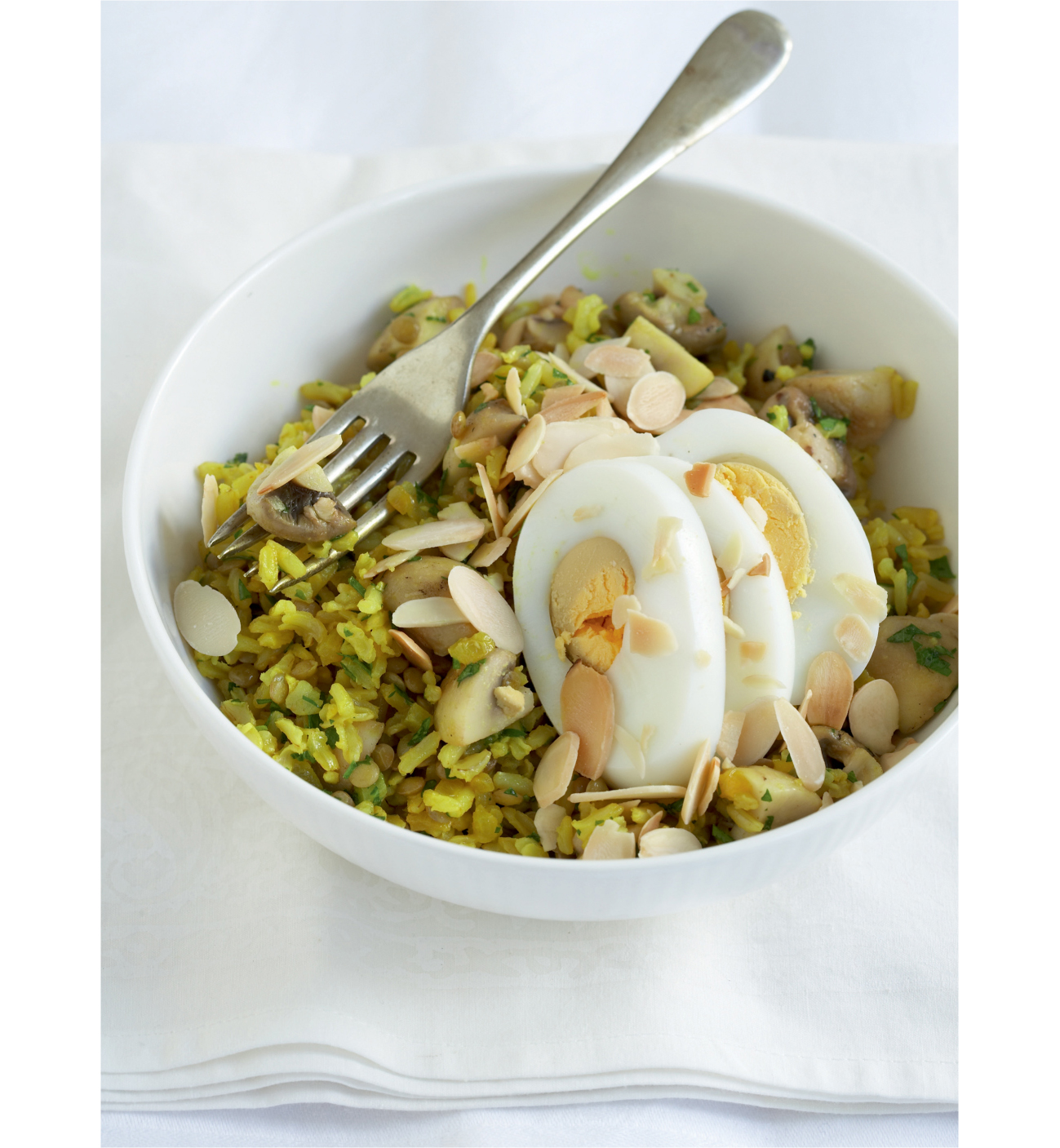
Ingredients
- 1 T (15 ml) olive oil
- 1 large onion, peeled and finely diced
- 2 t (10 ml) crushed garlic
- 1⁄2 t (2.5 ml) ground turmeric
- 150 g baby button mushrooms or quartered large buttons
- 2 T (15 ml) lemon juice
- 2 cups (500 ml) cooked brown basmati or other rice
- 1 x 400 g can brown lentils, drained and rinsed
- 1⁄2 cup (125 ml) chopped fresh parsley
- 1⁄2 cup (125 ml) toasted almond slivers
- salt and pepper to taste
- 4 hard-boiled eggs, shelled and quartered
Method
- Heat the oil in a frying pan and fry the onion, garlic, turmeric and mushrooms until any excess liquid has evaporated and the vegetables are tender.
- Add the lemon juice, rice, lentils, parsley, almonds and seasoning and stir well to combine. Allow to warm through over a low heat.
- Transfer to a serving dish, top with the quartered eggs and serve with some chopped tomato-onion salad, tzatziki and warm pitas.
Serves 4–6
Oven-baked ratatouille with Parmesan crust
A classic Mediterranean vegetable medley that goes with almost anything, is scrumptious hot or cold and lasts for ages in the refrigerator. This oven-baked version was devised by a cook (me) who absent-mindedly left one too many stove-top versions to cook to a gloop. Not only is this recipe fail-proof, it’s dead easy too.
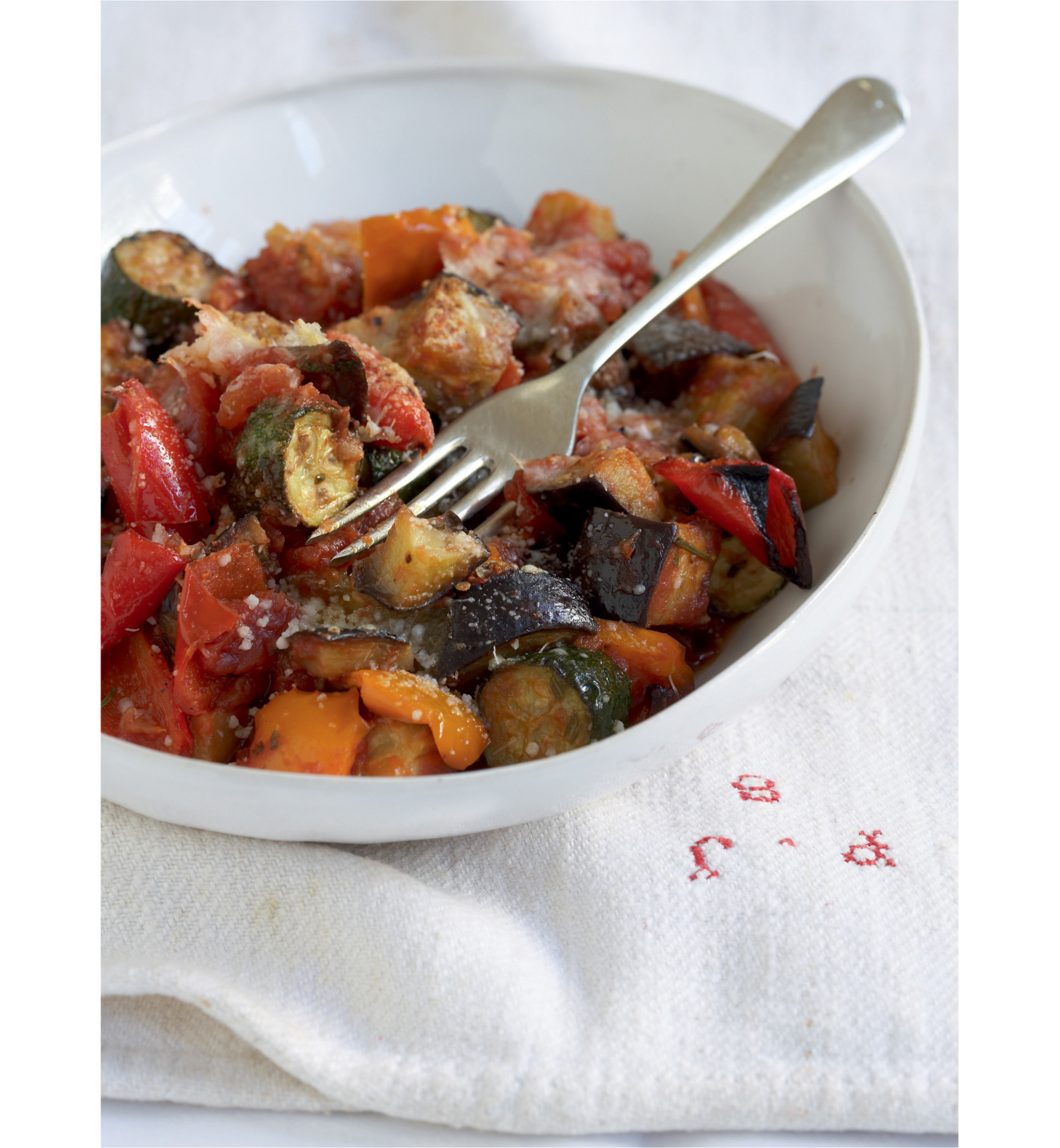
Ingredients
- 350 g courgettes, washed and chopped into 3 cm chunks
- 2 large aubergines, washed and cut into 3 cm squares
- 4 large sweet peppers (any colour), deseeded and cut into 4 cm squares
- 2 T (30 ml) extra-virgin olive oil
- 1 T (15 ml) crushed garlic
- 2 t (10 ml) chopped fresh rosemary
- 1⁄2 t (2.5 ml) fresh thyme or 1 t (5 ml) dried
- salt and pepper to taste
- 1 x 410 g can chopped peeled tomatoes
- 1 T (15 ml) balsamic vinegar
- 1⁄2 cup (125 ml) grated Parmesan
Method
- Preheat the oven to 200 °C.
- Place the courgettes, aubergines and peppers in a single layer in a roasting pan.
- Mix the oil, garlic, herbs, salt and pepper, and pour over the vegetables. Stir well to coat thoroughly.
- Roast in the oven for about 30 minutes until tender and slightly browned.
- Remove from the oven and pour over the tomatoes and balsamic vinegar. Mix well and sprinkle over the Parmesan. Roast for a further 30 minutes, until a crust has formed on top of the ratatouille.
Serves 4–6
Chef’s tip
If you plan to make the ratatouille to keep in the refrigerator, leave out the Parmesan.
Wholewheat fusilli with goat’s cheese, pecans, sun-dried tomato, basil and chilli
A no-cook store-cupboard sauce, packed with protein and carbohydrates for an energy boost.
Ingredients
- 375 g wholewheat spiral pasta (fusilli)
- 12 sun-dried tomato halves in oil, chopped
- 150 g goat’s cheese, crumbled
- 1⁄2 cup (125 ml) coarsely chopped toasted pecan nuts
- 8 basil leaves or 1 handful of rocket leaves, torn
- 1 small red chilli, deseeded and finely minced
- 1 t (5 ml) crushed garlic
- 1⁄4 cup (60 ml) red wine vinegar
- 2 t (10 ml) grain mustard
- salt and pepper to taste
Method
- Cook the pasta in a saucepan of well-salted, rapidly boiling water until just tender – about 15 minutes. Drain.
- Mix the remaining ingredients in a bowl and add to the pasta. Toss to coat.
- Let the pasta stand for about 10 minutes for the flavours to marry, then serve. This dish is also good cold and will keep for a day in an airtight container in the refrigerator.
Serves 4
Pizza
A perfectly decent pizza can be made in an ordinary domestic oven with no fussing about special tiles, tins, et cetera required. I use plain old baking tins and turn the heat up high. You can even braai pizzas over the coals, the instructions for which are given below. For the bases, use the focaccia recipe on page 173, but leave out the crushed garlic. After the first rising, the balls of dough are flattened and rolled out thinly to be covered with a tomato base and toppings. I use tomato concentrate straight from the jar for my base, but you can use tomato purée if you prefer a lighter taste. Bake the pizzas at 220 °C.
Some topping suggestions
- Artichoke quarters, pitted green olives, thyme, fried bacon cubes and mozzarella
- Salami, ricotta, strips of sweet red pepper, cherry tomatoes and rosemary
- Mushrooms, bacon, mozzarella, paper-thin slices of aubergine, garlic, chilli and olive oil
Braai pizzas
- Position the grill about 10 cm above the coals. Test the temperature by holding your outstretched hand about 13 cm above the coals. Once you can hold your hand there for 3–4 seconds, the temperature is right.
- Make pizza bases as above. Lay one base on the grill – not over the hottest coals – and grill for about 1 minute, until the dough puffs up.
- Using tongs, flip the pizza base over and drag it to a cooler part of the grill. Brush lightly with olive oil and proceed with your desired toppings, putting the cheese on first.
- Drizzle over 1 T (15 ml) or so of olive oil, season well and grill over the hotter coals for 6–8 minutes. You may have to move the pizza about on the grill to prevent scorching.
Sesame-marinated crispy tofu with broccoli and noodles
Tofu is a pretty tasteless yet high-protein substance that promiscuously soaks up the flavour of whatever it’s marinating in. Grilling shaves the fat content to practically zero.
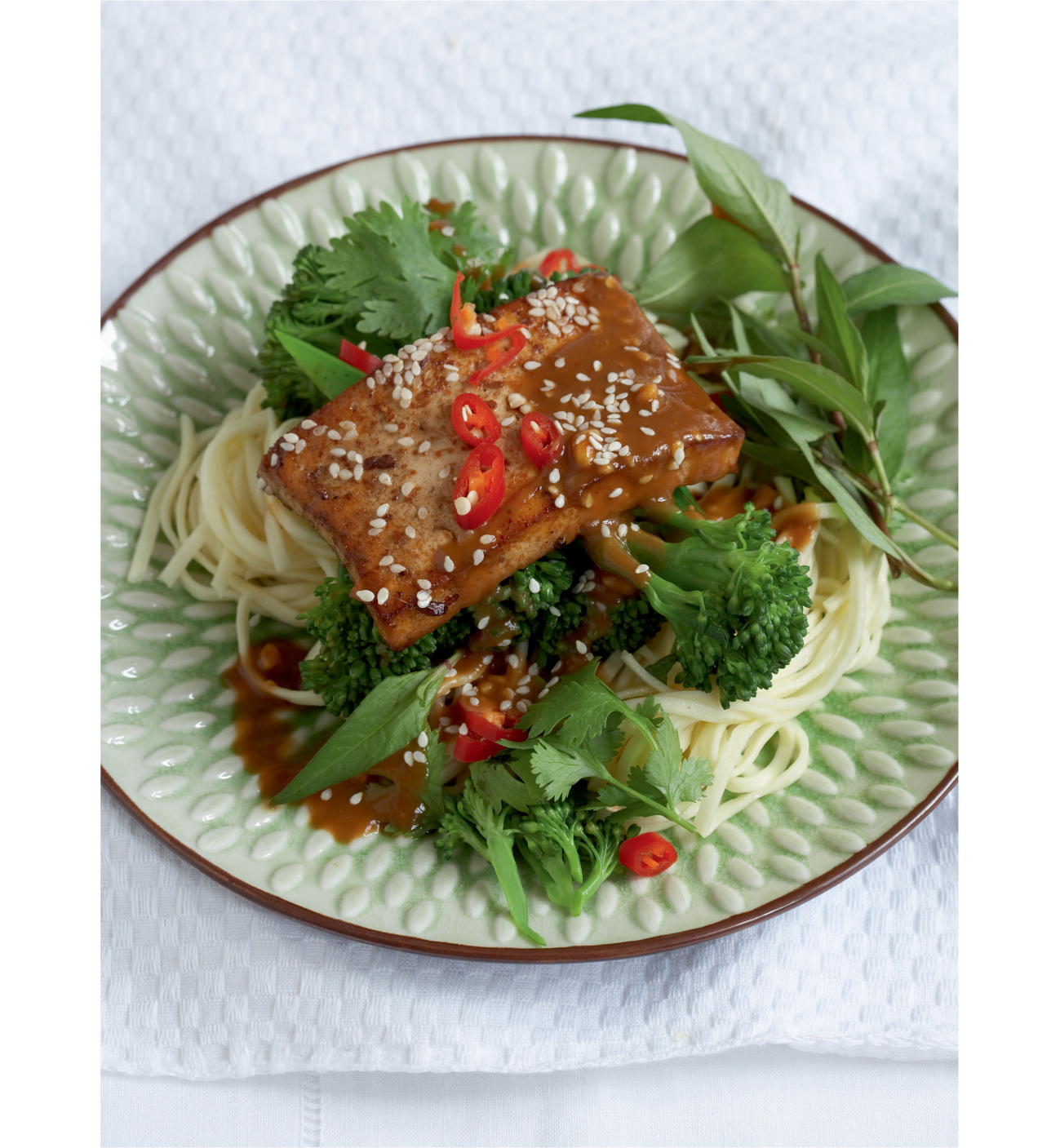
Ingredients
- 500 g firm tofu, drained
- 2 T (30 ml) sesame oil
- 1 t (5 ml) grated fresh ginger
- 1⁄4 cup (60 ml) light soy sauce
- 3 T (45 ml) sesame seeds
- 450 g broccoli florets
- 2 t (10 ml) sesame oil
- 1 small red chilli, deseeded and minced
- 1 t (5 ml) crushed garlic
- 250 g Chinese egg noodles
- 1 T (15 ml) peanut butter
- 1⁄4 cup (60 ml) boiling water
- 1 T (15 ml) soy sauce
- handful of fresh coriander, finely chopped
Method
- Cut the tofu into 1 cm-thick slices. In a bowl, mix the sesame oil, ginger, soy sauce and sesame seeds and add the tofu. Toss to make sure they’re coated on all sides, then lay the slices on a baking tray and leave to marinate for at least 30 minutes.
- Meanwhile, steam the broccoli in a sieve over a saucepan of boiling water for 3–4 minutes, until just tender. Drain well.
- Heat the remaining sesame oil in a frying pan and sauté the broccoli, chilli and garlic for about 3 minutes. Remove from the heat and set aside.
- Cook the noodles according to the packet instructions and set aside.
- In a bowl, whisk together the peanut butter, boiling water and soy sauce until smooth. Place the broccoli and noodles in a serving dish and pour over the peanut sauce. Toss to coat thoroughly.
- Heat the oven’s grill and grill the tofu on both sides for 10–15 minutes until golden brown and crisp. Remove from the baking tray with a slotted spoon and arrange on top of the broccoli and noodles. Drizzle over any remaining marinade, scatter with coriander and serve warm or at room temperature.
Serves 4
Mediterranean fish baked with aubergine, origanum and peppers
If you’re so inclined, prawns or crayfish instead of fish would take this dish to a whole new level. This is sublime served hot or cold, and perfect as part of a summer buffet.

Ingredients
- 750 g firm-fleshed white fish
- 6 T (90 ml) cake flour, seasoned with salt and pepper
- 1⁄4 cup (60 ml) olive oil
- 2 large onions, peeled and chopped
- 2 t (10 ml) crushed garlic
- 1 large aubergine, washed and cut into 3 cm chunks
- 2 large sweet peppers (any colour), deseeded and chopped into 3 cm chunks
- 1 x 410 g can chopped peeled tomatoes
- 1 T (15 ml) tomato concentrate
- 1⁄2 cup (125 ml) dry red wine or fish stock
- salt and pepper to taste
- 1 T (15 ml) chopped fresh origanum
- 2 T (30 ml) chopped fresh parsley
- 1 t (5 ml) grated lemon zest
Method
- Cut the fish into 5 cm-thick chunks and toss in the seasoned flour. Shake off and discard the excess flour.
- Heat the oil in a large frying pan and fry the fish for about 2 minutes each side, until light golden brown, but not completely cooked. Remove with a slotted spoon and set aside.
- To the same pan, add the onions, garlic, aubergine and peppers and cook over a high heat for about 12 minutes, until the vegetables have softened and any excess liquid has evaporated.
- Reduce the heat and add the tomatoes, tomato concentrate and red wine or stock. Season well with salt and pepper and simmer gently until thickened.
- Add the fish, herbs and lemon zest and cook in the sauce for 10–15 minutes until just done. Serve with boiled baby potatoes, crusty bread and a green salad.
Serves 4
Baked whole fish in olive oil, white wine, bay leaves, vine tomatoes, black olives and onion
Any firm white fish will benefit from this simple treatment, with freshly caught the undisputed champion of course. If frozen hake or some such is your only option, make sure it’s properly defrosted before going into the marinade.
Ingredients
- 1.6–2 kg fresh, firm white fish, descaled and gutted
- salt and pepper to taste
- 1 T (15 ml) olive oil
- 2 large onions, peeled and sliced into rings
- 2 t (10 ml) crushed garlic
- 1⁄2 cup (125 ml) dry white wine
- 1⁄2 cup (125 ml) olive oil
- juice of 1 lemon, flesh chopped into chunks
- 1 cup (250 ml) pitted black olives
- 2 cups (500 ml) halved baby tomatoes or 3 large ripe, chopped
- 2 T (30 ml) coarsely chopped fresh parsley
- 1 T (15 ml) chopped fresh origanum
- 2 t (10 ml) chopped fresh thyme
- 6 bay leaves
Method
- Place the fish in a large ovenproof dish and season well with salt and pepper.
- Heat the tablespoon of olive oil in a frying pan and fry the onion rings and garlic until just soft. Remove with a slotted spoon and arrange over the fish.
- Mix the wine, olive oil, lemon juice and flesh and pour over the fish.
- Scatter over the olives, tomatoes, herbs and bay leaves and leave to marinate for 30 minutes while you preheat the oven to 200 °C.
- Bake the fish for 10 minutes, then, without opening the oven door, reduce the temperature to 180 °C and bake for a further 35–40 minutes, until just done. While cooking, baste the fish with the surrounding wine and olive oil sauce.
- The fish is done when it flakes easily with the tip of a knife inserted next to the backbone.
- Serve warm or at room temperature with rice or boiled baby potatoes and salad.
Serves 4–6
Apple and blueberry crumble
I prefer to use canned pie apples for this, as raw apples often cook into an unappetising mush. Replace the blueberries with 1⁄2 cup (125 ml) seedless raisins plumped in some hot water (or brandy, if you’re feasting!). Another heavenly base for a crumble is made from canned pineapple rings, chunks of fresh mango and some fresh strawberries.
Filling
- 1 x 385 g can pie apples
- 150 g fresh or frozen blueberries
- 2 T (30 ml) brown sugar
- 1⁄2 t (2.5 ml) ground cinnamon
- 1⁄2 t (2.5 ml) ground allspice
- 1 t (5 ml) vanilla essence
- 2 T (30 ml) melted butter
Topping
- 125 g unsalted butter, cut into tiny dice
- 100 g rolled oats or oat bran
- 100 g slivered almonds, roughly chopped
- 2 T (30 ml) sesame seeds
- 150 g brown sugar
- 1⁄2 t (2.5 ml) ground cinnamon
- 1 t (5 ml) ground ginger
Method
- Place the apples and blueberries in a bowl.
- Stir the brown sugar, spices and vanilla essence into the melted butter and pour over the fruit. Stir well and set aside for 20 minutes to soften.
- Preheat the oven to 180 °C.
- For the topping, in a separate bowl, rub the butter into the oats, almonds, seeds, sugar and spices until the mixture resembles coarse breadcrumbs.
- Spoon the softened fruit into a pie dish and scatter the crumble on top, covering the fruit. Bake on the middle shelf of the oven for 35–40 minutes until golden brown. Serve hot or cold with Greek yoghurt or thick cream.
Serves 4
Phyllo pears and honey with dark chocolate chips and slivered almonds
Pears, chocolate, pastry, honey and nuts – what’s not to love? We’re not trying to be saints, you know. However, dark chocolate is reputedly packed with antioxidants, nuts are rich in selenium and organic honey contains healthy enzymes.

Ingredients
- 2 T (30 ml) melted butter
- 1 T (15 ml) boiling water
- 1⁄4 cup (60 ml) honey
- 3 sheets phyllo pastry
- 8 canned pear halves
- 1⁄4 cup (60 ml) dark chocolate chips
- 3 T (45 ml) roasted slivered almonds
- 50 g dark chocolate
- 50 ml cream
- Greek yoghurt to serve
Method
- Preheat the oven to 180 °C and spray a baking tray with non-stick cooking spray.
- Combine the melted butter with the boiling water and 1 t (5 ml) of the honey. Use to lightly brush each sheet of phyllo and stack the sheets on top of each other.
- Cut four squares out of the stacked phyllo sheets. Quarter the pear halves and place in the centre of each square.
- Sprinkle over the chocolate chips and 2 T (30 ml) of the almonds in equal proportions and drizzle over a little honey.
- Roll the phyllo away from you, folding the edges inwards to make a neat cigar.
- Brush with the remaining honey and melted butter mix and press the edges to seal.
- Bake on the middle shelf of the oven for about 20 minutes, until golden brown.
- Melt the chocolate and cream in a small saucepan over a medium heat, stirring to combine. Drizzle over the baked phyllo cigars, scatter with the remaining almonds and serve hot or at room temperature with a dollop of Greek yoghurt.
Makes 4
Pashka – ricotta with figs, ginger, cranberries and nuts
Really fresh ricotta should be eaten as soon as it is bought. Ultra-low in fat, mixed with a little mascarpone, some choice fruits and nuts, it makes a good pudding not only during fasting but also feasting times. In the latter case, I’d drench it with some seriously good chocolate sauce and serve a little glass of dessert wine alongside for good measure.

Ingredients
- 350–400 g fresh ricotta
- 2 T (30 ml) mascarpone
- 4 soft dried figs, roughly chopped
- 2 T (30 ml) preserved ginger, chopped
- 2 T (30 ml) preserved ginger syrup
- 2 T (30 ml) dried cranberries
- 2 T (30 ml) pecan nuts or any other similar nuts, roughly chopped
- 1 T (15 ml) honey to serve
Method
- Place all the ingredients, except the honey, in a mixing bowl and lightly stir until just combined.
- Spoon into four pretty glasses and chill until required.
- Drizzle a little honey over each before serving.
Serves 4
Ginger banana brûlée with Greek yoghurt
If you must have a sugar fix have muscovado sugar, which is somewhat unrefined and, therefore, retains some vitamins and minerals. It is also ideal for this deceptively simple dessert.
Ingredients
- 4 ginger snaps, coarsely crumbled
- 2 bananas, peeled and sliced
- 1⁄2 cup (125 ml) fresh blueberries or strawberries
- 400 ml Greek yoghurt
- 1⁄4 cup (60 ml) muscovado sugar
Method
- Divide the crumbled ginger snaps, fruit and yoghurt evenly between four pretty glasses.
- Spoon the muscovado sugar on top and refrigerate for 30–60 minutes, until the sugar has melted into a rich caramel. Serve cold on the same day of making.
Serves 4















